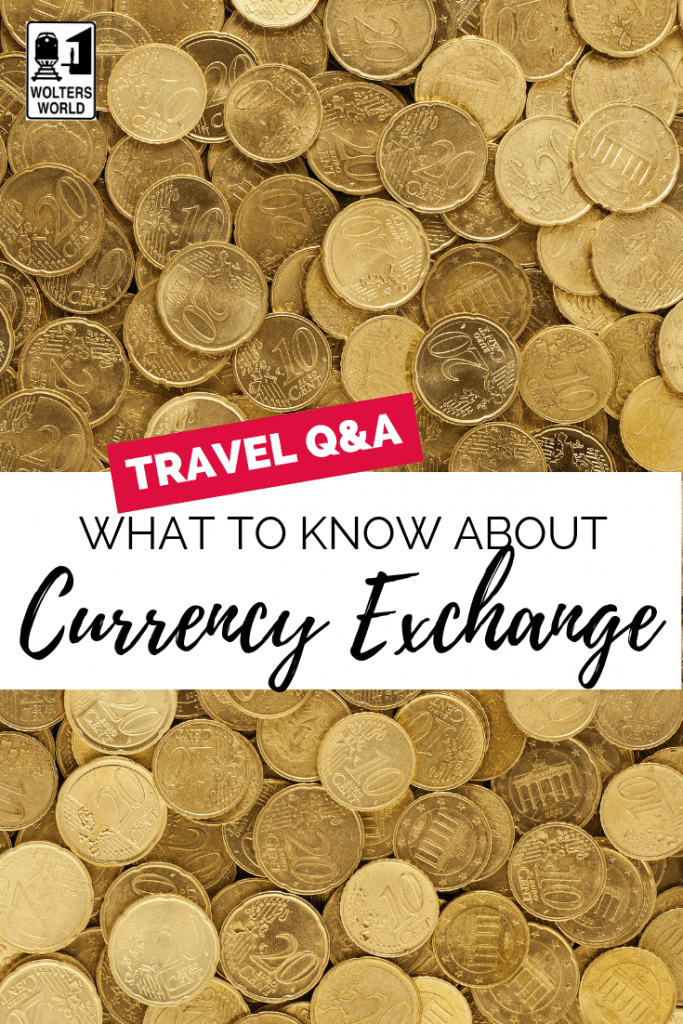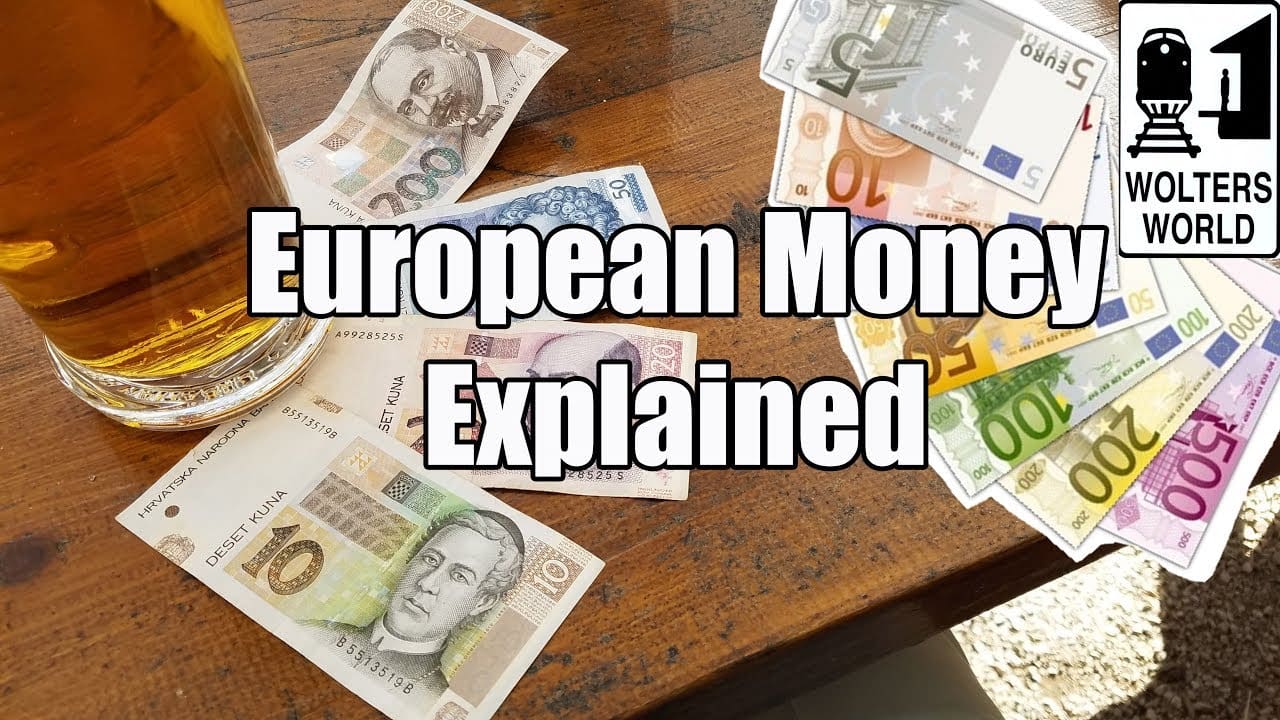Hey there, fellow travelers! We often get travel questions from our fans, so today I’m going to focus on a topic that comes up quite often: money. We’ll cover how, when and where to exchange currency, plus everything you need to know about money in Europe.
How Do I Get the Best Deal Exchanging Currency?
The best deal you can get is not to exchange currency at all. You’ll get the best exchange rate from your home bank, so the best thing to do is to use your ATM card to withdraw cash in the local currency. Don’t forget to tell your bank that you’re traveling abroad; they will put a flag on your account to authorize the transactions. If you forget to do this, you’ll most likely be declined at the ATM. Do this with credit cards, too and make sure you have your PIN for every card you have. (Have a list somewhere of phone numbers for your cards in case you need to reach them.)
Watch: Best & Worst Way to Exchange Foreign Currency
What If I Don’t Want to Use My ATM and Credit Cards?
If you don’t want to use cards and insist on bringing cash along to exchange, you’re going to pay a lot regardless. There really ins’t a “best place” to exchange currency, but the worst place is at the airport. You know how you pay $4 for a bottle of water at the airport? Well, the currency exchange rates are equally inflated because you are a captive customer. On top of a poor exchange rate, you’ll pay a lot of fees. You’ll find the same bad rates and fees at the money exchange shops in the tourist areas of town.
Your best bet is to look for a large international bank, and see if they will exchange your currency. They may or may not, depending on the bank. In the US, most banks will only do this for customers who have an account with the bank.

Should I Exchange Money Before My Trip?
Many travelers like to have local currency before arriving to a destination, while others just wait until landing to get local currency. You can get some Euros or Pounds from your local bank before you leave for your trip, but it’s not usually a very good rate. We wait until we land at a new destination, and we use our ATM card to withdraw cash. Worst case scenario, you can always exchange some of the cash you have if the ATM doesn’t work.
Watch: When to Exchange Money
Do I Want the Transaction in Local Currency or Converted to My Home Currency?
Some ATM’s (and shops, hotels and restaurants) will offer to convert your transaction into your home currency. You may like this option because it’s easier to tell how much you are spending, but the exchange rate is much worse than what you will get from your bank. The vendor is going to take a cut for this “convenience” and you’ll end up paying more. So, if you are asked “would you like this in dollars or Euros?” choose dollars and let your bank do the conversion.
Is Cash or Card Better in Europe?
You can still use cash almost anywhere in Europe, and many smaller towns and establishments prefer cash, especially for smaller purchases. They won’t be happy if you try to charge a can of soda or a pack of gum. The same applies for large bills; vendors will not want to take a 100 Euro bill for a small purchase, so try to have smaller bills and coins to carry around. Since the ATM generally gives out big bills, your hotel can break this into smaller bills.
What If I See Prices in Euros But I’m Not in a Euro Country?
Similar to letting the vendor convert your credit card charge before running the transaction, many places will try to “help” tourists by posting prices in Euros, even though that’s not the local currency. Again, you are then getting their exchange rate, which is never better than the exchange rate your bank will give you, so if you can, pay in the local currency.
I Don’t Want to Carry a Lot of Cash; What Do You Recommend?
Carrying a lot of cash is a good way to become a target for thieves, so it’s a good idea not to carry a ton of cash at all times. We like to rely on a combination of cash and credit cards while traveling abroad. Visa and MasterCard are accepted almost everywhere; while American Express is sometimes accepted. Diners Club and Discover Card are more difficult to use. Regardless of the card, make sure you know the PIN. Use your credit card where you can, then save your cash for the places who won’t accept cards.
Something else you should do is to split up your cash. Keep it in a few different places on you, and lock some away back at the hotel. This way, if you lose some or are pickpocketed, you won’t lose all of your cash. Keeping a small amount of cash readily available also saves you from flashing a huge wad of cash when making small purchases. I like to keep a small amount in a pocket, with more tucked away in my wallet.
Should I Use My Debit Card or Credit Card?
To withdraw cash at a foreign ATM, your best bet is to use your debit card for the best rate and lowest fees. Credit cards often have a higher fee and higher interest rates on cash withdrawals, so this should be an emergency backup only. For charging transactions, your credit card is fine, especially if you are earning airline or hotel points on your purchases.
What if My Card Gets Stolen?
This is why it’s important to have a list of the phone numbers for your cards; if a card gets stolen (or lost), you need to be able to reach out right away. However, know that it can be difficult to get a new card issued to you right away, especially if you are moving every few days to a new location. For this reason, it’s a good idea to have at least two credit cards while traveling, and keep them in separate places.
What About Traveler’s Checks?
Traveler’s checks used to be very popular before the digital age. They’ve pretty much died out, and you really don’t see them any more, nor will many places accept them. If you want something pre-paid to keep you on a spending budget, you can get a prepaid credit card. Prepaid cards also have a better backup option if stolen, as you can get the money refunded and turn the card off.
Should I Exchange All My Money Before Heading Home?
We come to Europe three or four times a year, so we always keep a bit of currency leftover for our next trip. However, if you’re not sure whether you’ll return, or if you just prefer to have the money back, there are a few options:
- Use up all of your cash before you leave. If you are pretty good at budgeting your travel, this is pretty easy and you can use up the last of your currency buying snacks at the airport.
- Donate it. Many airports have a donation bin near customs where you can toss in your leftover change and donate it to a local charity.
- Your bank at home can often change your currency back to local currency, although I found that banks often only accept bills, not coins, so you could still have a good chunk of change leftover, given the value of Euro coins.
- Sell it to a friend or coworker. Chances are, you know someone heading to Europe in the future. Offer to exchange currency with them; you’ll both get a better rate than the banks, and they’ll start their trip with a bit of cash.
Will My ATM Card Work?
In some countries like Italy, you will need to have a chip card to use your card. At night, you need the chip just to unlock the door to get to the ATM. And although the local language may not be English, it’s always an option so you just have to look for that and choose English. For Chinese travelers, Union Pay is becoming more widespread in Europe, too.
What Do I Need to Know About Euro Coins?
Unlike in the US, the coins in Europe are actually valuable. A two Euro coin is worth more than $2, so hang on to them. Don’t throw your coins away, but use them when you can, or your wallet will get pretty heavy very quickly. Try not to take too many coins home with you as they are harder to exchange than bills.

I hope these travel money tips answer some of your money exchange questions. With these tips, you should be able to save some money in fees, and get the best exchange rate for your money, which means more money to spend on travel! If you’d like more travel tips, check out these blog posts and videos:
